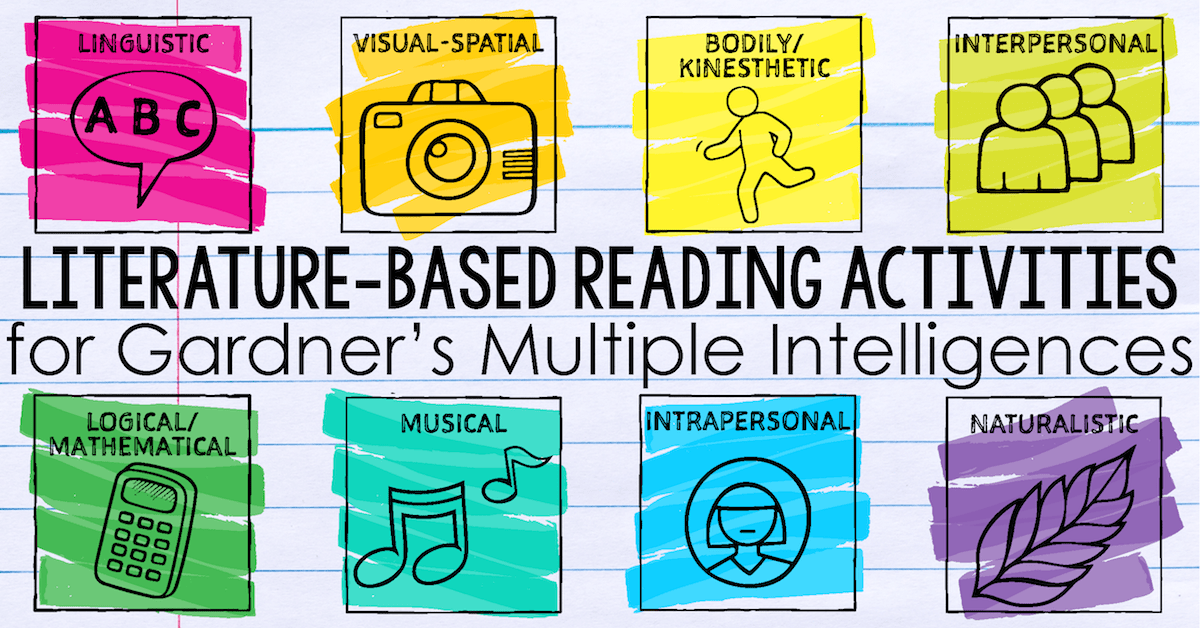Howard Gardner expanded our understanding of intelligence by arguing that the focus should not be on how smart a person is, but rather, how a person is smart. The theory of multiple intelligences differentiates intelligence into specific “modalities,” rather than seeing intelligence as dominated by a singular ability. As teachers, we know the value of respecting individual differences in learning and expression. We are always careful to provide a wide range of instructional activities that allow students to learn and demonstrate their understanding in a variety of ways. The list below provides literature-based reading activities for each intelligence. When planning your instruction, aim to engage students in activities from at least three of the categories below. You can also offer students choices from below when assessing their understanding of a story they are reading.
Verbal/Linguistic
- Debate an issue within the story with another student.
- Create and perform a play based on the story (Readers’ Theater).
- Write a poem that is related to the story.
- Keep a double-entry journal (quotes from the text vs. student’s response\thoughts).
- Write an acrostic poem based on a character’s name.
Visual/Spatial
- Use magazine images to create a collage about the setting or main character.
- Construct a mobile that shows the relationships within the story.
- Design a logo or icon to represent a theme within the story.
- Color code or highlight important information in the text.
- Complete a plot diagram for the story.
Bodily/Kinesthetic
- Play a game of “character charades” or pantomime a character.
- Cook a recipe of a dish from the story.
- Use papier-mâché or clay to make a model of something from the story.
- Perform a dramatic reading of a scene from the story.
- Choreograph and perform a dance that represents a conflict within the story.
Interpersonal
- Read with a classmate (buddy reading).
- Interview classmates about books they are reading.
- Participate in a Reciprocal Teaching group activity with three other students (Summarizer, Questioner, Clarifier, Predictor).
- Research the setting, era, or author of the story with a classmate.
- Create a game that is related to the story for your classmates.
Logical/Mathematical
- Compare and contrast two different stories, characters, settings, plot… etc.
- Distinguish facts and opinions within the text.
- Identify and explain cause-and-effect relationships from the story.
- Identify anomalies or missing information from the text.
- Create an analogy or metaphor that explains a relationship within the story.
Musical
- Listen to music from the era of story.
- Write a rhythmic poem, chant, or rap about the story.
- Find music that represents the mood, setting, or character of the story.
- Participate in a choral reading with classmates.
- Perform an improvise musical composition related to the story.
Intrapersonal
- Track your progress (Words Per Minute) on repeated readings of a section from the text.
- Select a character that you most identify with and explain why you relate to this person.
- Identify and evaluate how events, characters, or settings from the story make you feel.
- Explain how something from the story can be applied or connected to your life.
- Monitor your own thinking and understanding as you read the story (metacognition).
Naturalistic
- Identify and explain how natural forces (weather, animals, plants, science… etc.) affect the story.
- Explain which character would be the most likely to survive being stranded in the wilderness.
- Collect items on a nature walk that can be used to create a collage or model related to the story.
- Take a mini-field trip outside to read (park, playground, grass field… etc.).
- Keep a log of nature’s impact on the daily life of the characters.
I created a little “cheat sheet” of these activities that you can download for free. Simply enter your email address below, and I will send it right over.
Looking for resources to improve reading comprehension? Check out my year-long reading passages (grades 4-6 coming soon).





















